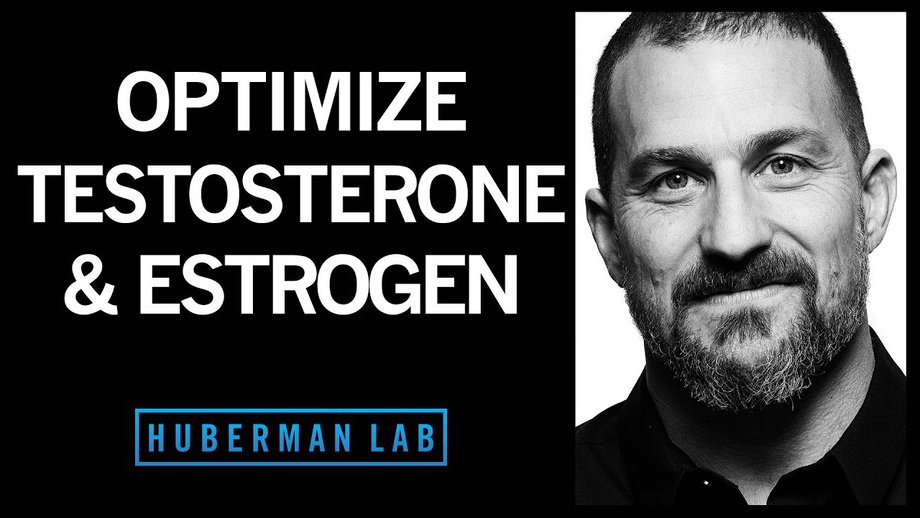How to Optimize Testosterone & Estrogen Hormones

Unleash Your Hormonal Potential: Mastering Testosterone & Estrogen
A guide to understanding hormone modulation and optimizing testosterone and estrogen levels for improved well-being and quality of life.
- Hormonal Potential: Understanding the importance of testosterone and estrogen in the body and their impact on overall health and vitality.
- Testosterone Optimization: Exploring strategies and techniques to naturally increase testosterone levels, including lifestyle changes, exercise, and dietary modifications.
- Estrogen Modulation: Understanding the role of estrogen in both men and women and learning how to balance estrogen levels for optimal health and well-being.
- Hormonal Balance: The importance of maintaining a healthy balance between testosterone and estrogen for overall hormonal harmony and well-being.
- Lifestyle Factors: Exploring how stress, sleep, diet, and exercise can influence hormone levels and learning how to make positive changes to support hormonal health.
- Hormone Testing: Understanding the different methods of hormone testing and when it may be necessary to seek professional help to assess and optimize hormone levels.
- Personalized Hormone Optimization: Exploring individualized approaches to hormone optimization based on unique needs, goals, and health conditions.
- Achieving Well-Being: Harnessing the power of hormone modulation to enhance overall well-being, energy levels, mood, and quality of life.
- Beyond Hormones: Recognizing that hormones are just one piece of the puzzle and exploring other factors that contribute to overall health and happiness.
- Empowering Yourself: Taking charge of your hormonal health and well-being by implementing the knowledge and strategies shared in this guide.
Unleash Your Hormonal Potential: Mastering Testosterone & Estrogen provides a comprehensive understanding of hormone modulation and offers practical tips and strategies to optimize testosterone and estrogen levels for improved well-being and quality of life.
Key Takeaways
- Hormones such as estrogen and testosterone can significantly impact mood, behavior, and feelings of well-being.
- Hormone optimization involves understanding and balancing hormone ratios, which can be influenced by our actions, thoughts, and various tools including behavioral changes, supplementation, and prescription drugs.
- Hormone levels can vary greatly between individuals and across the lifespan, and it is important to consult with a medical doctor, particularly an endocrinologist, for hormone examination and optimization.
- Testosterone plays a crucial role in behavior, including reducing anxiety, promoting novelty-seeking, and increasing libido and desire to mate, while estrogen is involved in reproductive behavior and libido in both males and females.
The Impact of Hormones on Well-being
Hormones play a crucial role in influencing our overall well-being. They affect our mood, behavior, and feelings of optimism or pessimism. Hormone regulation is essential for maintaining a balanced and healthy state.
However, imbalances in hormone levels can lead to various health issues and impact our well-being. Understanding the importance of hormone optimization is key to achieving optimal health and reproduction.
Hormone optimization involves a combination of basic biology and practical tools to optimize hormone ratios. This process is not limited to performance enhancement in sports but extends to everyday life.
Estrogen and testosterone, along with their derivatives, are the primary hormones of focus in hormone optimization. By utilizing behavioral tools, supplementation, and prescription drugs, hormone ratios can be influenced to enhance overall well-being.
It is crucial to consult with a medical doctor, preferably an endocrinologist, to examine hormone levels and ensure proper regulation.
Understanding Hormone Optimization
Understanding hormone optimization is a crucial step towards achieving optimal health and well-being, as imbalances in hormone levels can have significant impacts on our overall physiological and psychological state. Hormone optimization techniques can help restore balance and improve our quality of life.
Here are three key points to consider:
- Impact of hormone imbalances: Hormone imbalances can lead to a variety of symptoms and health issues, including mood swings, fatigue, weight gain, decreased libido, and reduced muscle mass. Understanding the impact of these imbalances is essential for addressing and correcting them.
- Hormone optimization techniques: There are various techniques available to optimize hormone levels, such as lifestyle modifications, including exercise, stress management, and adequate sleep. Additionally, supplementation and prescription medications may be recommended to restore hormonal balance.
- Importance of seeking professional guidance: It is crucial to consult with a healthcare professional, such as an endocrinologist, to accurately assess hormone levels and develop a personalized hormone optimization plan. They can provide expert guidance and monitor progress to ensure optimal results.
Hormone Levels and Medical Consultation
Medical consultation is essential for accurately assessing hormone levels and developing an effective hormone optimization plan. Hormone examination, conducted by a medical doctor, is crucial in understanding the variations in hormone levels that occur between individuals and across the lifespan.
Endocrinologists, who specialize in hormone-related issues, play a significant role in this process. They have the expertise to interpret hormone test results, identify any imbalances or deficiencies, and recommend appropriate interventions.
Understanding hormone levels is important for optimizing overall health and well-being, as hormones have a significant impact on various aspects of our physiology and behavior.
Variations in Testosterone Levels
Testosterone levels exhibit significant variations among individuals, influenced by factors such as genetics, age, and other physiological and environmental factors. Understanding these variations is crucial in optimizing overall health and well-being.
Here are three key points regarding variations in testosterone levels:
- Impact of genetics on testosterone levels: Genetic factors play a significant role in determining an individual’s testosterone levels. Certain gene variants can influence testosterone production and metabolism, leading to higher or lower levels.
- The role of testosterone in muscle development: Testosterone plays a vital role in muscle development and maintenance. It promotes protein synthesis, which is essential for muscle growth. Higher testosterone levels can contribute to increased muscle mass and strength.
- Environmental factors influencing testosterone levels: Environmental factors, such as diet, exercise, stress levels, and exposure to toxins, can also impact testosterone levels. Adopting a healthy lifestyle, including regular exercise, balanced nutrition, and stress management, can help optimize testosterone levels.
Understanding the variations in testosterone levels and their underlying factors can assist individuals in making informed decisions about their hormone optimization strategies.
Sources of Testosterone and Estrogen
The production of testosterone and estrogen, key hormones in the body, is primarily sourced from the adrenals and gonads. These hormones play a crucial role in various physiological processes, including hormone regulation in females and the effects of testosterone on behavior.
In females, estrogen is predominantly produced by the ovaries, while testosterone is produced in smaller amounts by the adrenal glands and ovaries. Testosterone, on the other hand, is mainly synthesized in the testes in males.
The release of testosterone and related derivatives from the adrenals is activated by competition. Testosterone can bind to the amygdala, a region of the brain involved in emotional processing, and affect stress thresholds. It has been found that testosterone can reduce anxiety and promote novelty-seeking behavior. Additionally, testosterone increases foraging, libido, and the desire to mate.
Understanding the sources and effects of testosterone and estrogen is essential for optimizing hormone ratios and promoting overall well-being.
The Behavioral Effects of Testosterone
Research has revealed that testosterone, a hormone primarily produced in the testes in males, has significant behavioral effects that can impact a wide range of aspects in an individual’s life. The effects of testosterone on mood and behavior are complex and multifaceted.
Here are three key ways that testosterone influences behavior:
1) Mood Regulation: Testosterone plays a role in regulating mood, with low levels of testosterone being associated with increased risk of depression and anxiety. Higher levels of testosterone, on the other hand, have been linked to improved mood and a greater sense of well-being.
2) Aggression: Testosterone is often associated with aggression, as it has been shown to increase dominance behaviors and competitiveness. However, it is important to note that the relationship between testosterone and aggression is not linear, and other factors such as social context and individual differences also play a role.
3) Risk-Taking Behavior: Testosterone has been linked to increased risk-taking behavior, including greater willingness to engage in financial risks and sensation-seeking activities. This may be due to testosterone’s influence on reward processing and the brain’s dopamine system.
Understanding the behavioral effects of testosterone can provide valuable insights into human behavior and may have implications for mental health and well-being.
The Role of Testosterone in Mating and Reproduction
Understanding the multifaceted effects of testosterone on mood and behavior opens the door to exploring its crucial role in the complex dynamics of mating and reproduction.
Testosterone plays a significant role in both males and females when it comes to mating and reproductive behaviors. In males, testosterone reduces the threshold for anxiety and promotes competitive behaviors. It increases the desire to mate, forage, and libido.
In females, increased testosterone levels lead to heightened libido and seeking of reproductive behavior. There is a feedback loop between testosterone and behavior, as winning promotes the release of testosterone and dopamine. Additionally, the physical act of sex can increase testosterone levels.
Testosterone also interacts with other hormones, such as DHEA, and is influenced by factors like aging. Understanding the role of testosterone in mating and reproduction can provide valuable insights into mental health and aging.
The Relationship Between Sex and Hormone Levels
Sexual activity has a profound impact on hormone levels, influencing the release of testosterone and dopamine and leading to various physiological and behavioral changes. Here are three key points to understand the relationship between sex and hormone levels:
- The effect of hormone imbalance: Hormonal imbalances can disrupt the delicate equilibrium of testosterone and other hormones in the body, leading to decreased sexual desire, erectile dysfunction, and other sexual health issues.
- The role of dopamine in hormone regulation: Dopamine, a neurotransmitter associated with pleasure and reward, plays a crucial role in regulating hormone levels. Sexual activity stimulates the release of dopamine, which in turn can enhance the production and release of testosterone.
- The impact on overall well-being: Engaging in regular sexual activity can have positive effects on mood, stress levels, and overall well-being. It can help reduce anxiety, promote feelings of connectedness, and boost self-esteem.
Understanding the relationship between sex and hormone levels can provide valuable insights into optimizing sexual health and overall wellness.
The Influence of DHEA on Hormone Production
After exploring the relationship between sex and hormone levels, it is important to delve into the influence of DHEA on hormone production, as DHEA plays a significant role in the synthesis of testosterone and estrogen.
DHEA, or dehydroepiandrosterone, is a precursor hormone that is produced by the adrenal glands. It serves as a building block for the production of other hormones, including testosterone and estrogen. DHEA levels naturally decline with age, and this decline has been associated with various hormonal imbalances and age-related conditions.
Studies have shown that DHEA supplementation can have positive effects on hormone balance, including increasing testosterone and estrogen levels. However, it is important to note that the effects of DHEA supplementation may vary depending on individual hormone levels and the activity of the enzyme aromatase, which converts testosterone to estrogen.
Therefore, consulting with a healthcare professional is recommended before considering DHEA supplementation to ensure optimal hormone balance.
Hormonal Changes During Parenthood
Parenthood is associated with significant hormonal changes that influence individuals’ behavior and promote parenting behavior. These hormonal changes post-pregnancy play a crucial role in shaping the experience of becoming a parent.
Here are three key points to understand about hormonal changes during parenthood:
- Hormonal changes post pregnancy: After giving birth, women experience a drop in estrogen and progesterone levels. This decrease in hormones can contribute to postpartum depression, a condition characterized by mood swings, sadness, and anxiety. Understanding these hormonal changes can help healthcare professionals provide appropriate support and treatment for postpartum depression.
- Hormones and postpartum depression: Research suggests that hormonal imbalances, along with other factors such as sleep deprivation and stress, can contribute to postpartum depression. Hormonal changes, particularly in estrogen and progesterone, can affect neurotransmitters in the brain, leading to mood disturbances. Identifying and addressing these hormonal changes can be crucial in managing postpartum depression.
- Seeking professional help: It is important for individuals experiencing hormonal changes during parenthood to seek medical assistance. Healthcare professionals, particularly endocrinologists, specialize in understanding and managing hormone-related issues. Consulting with a medical doctor can help individuals navigate the hormonal changes associated with parenthood and receive appropriate treatment if needed.
Parenthood brings about significant hormonal changes that can impact individuals’ well-being and mental health. Understanding these changes and seeking professional help when necessary can contribute to a positive parenting experience.
Behavior’s Effects on Hormone Modulation
Hormone modulation can be significantly influenced by various behaviors and external factors, leading to notable changes in testosterone and estrogen levels. One of the factors that can impact hormone modulation is smell. Smell has been found to play a role in hormone modulation, possibly through the effects of pheromones. In animals, the effects of pheromones on hormone levels are well-established. These pheromones can trigger changes in testosterone and estrogen levels, affecting behavior and reproductive processes. While the specific effects of smell and pheromones on hormone modulation in humans are still being studied, it is clear that our behaviors can have a significant impact on our hormone levels. Understanding and harnessing the power of these behaviors can be a valuable tool in optimizing hormone ratios and promoting overall well-being.
| Behavior’s Effects on Hormone Modulation | ||
|---|---|---|
| Behavior | Effect on Testosterone Levels | Effect on Estrogen Levels |
| Regular exercise | Increases | Can decrease |
| Stress | Can decrease | Can increase |
| Sleep | Increases | Can decrease |
| Social interaction | Increases | Can increase |
| Diet and nutrition | Can increase | Can decrease |
Frequently Asked Questions
How Can Hormone Optimization Impact Feelings of Well-Being and Reproduction?
Hormone optimization can significantly impact feelings of well-being and reproduction. It can benefit athletes by enhancing performance through hormone optimization, while hormone replacement therapy can help manage menopause symptoms and improve overall quality of life.
What Are the Sources of Testosterone and Estrogen in the Body?
Testosterone and estrogen are produced by the endocrine system, specifically the adrenals and gonads. The release of testosterone is activated by competition, while estrogen is the most active form of estrogen in both males and females.
Are There Variations in Testosterone Levels Among Individuals?
Variability in testosterone levels among individuals is influenced by genetics and other factors. Testosterone is produced by the adrenals and gonads, and competition activates its release. Testosterone levels can impact behavior, stress thresholds, and reproductive behavior.
How Does Becoming a Parent Affect Hormone Levels?
The transition to parenthood leads to significant hormonal changes in both expecting fathers and mothers. Testosterone levels decrease in fathers, while cortisol levels decrease and estradiol levels double. These hormonal shifts promote parenting behavior and prepare individuals for their new role.
What Are the Effects of IL-6 on Sex Steroid Hormones?
IL-6, a pro-inflammatory cytokine, has significant effects on sex steroid hormones. Increased levels of IL-6 reduce testosterone and estrogen levels, decreasing the desire for sex. IL-6 plays a crucial role in hormonal regulation.








